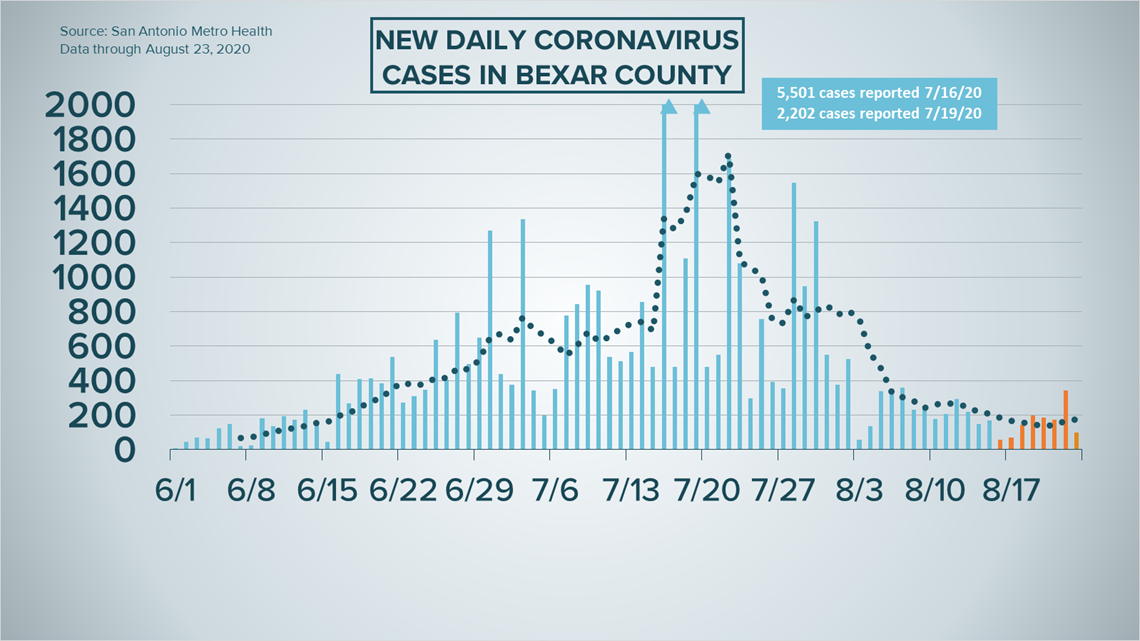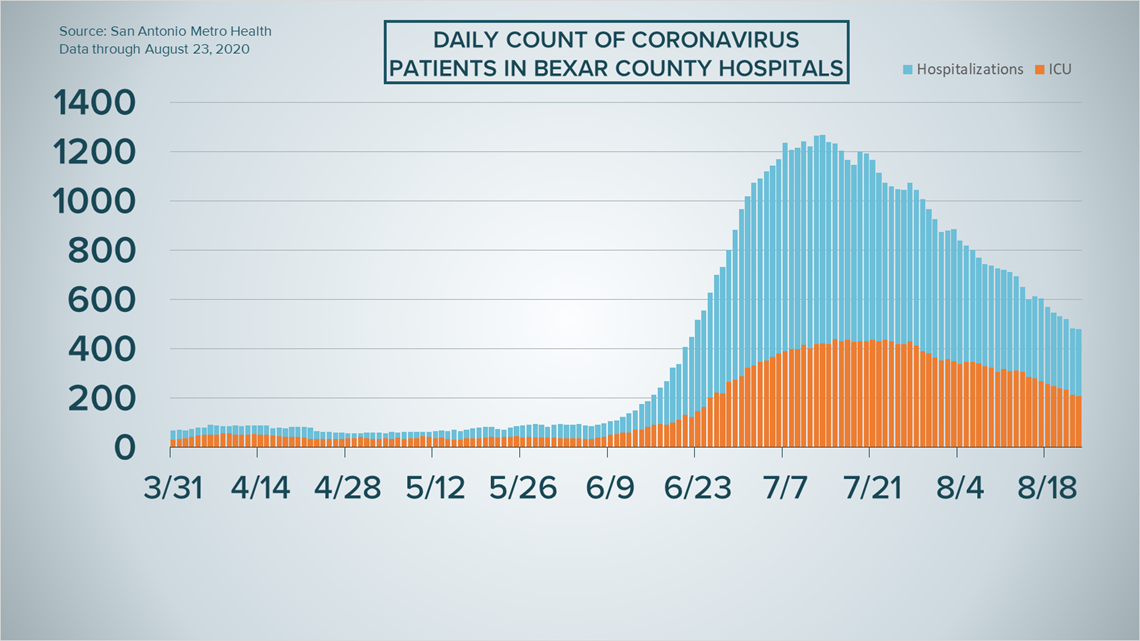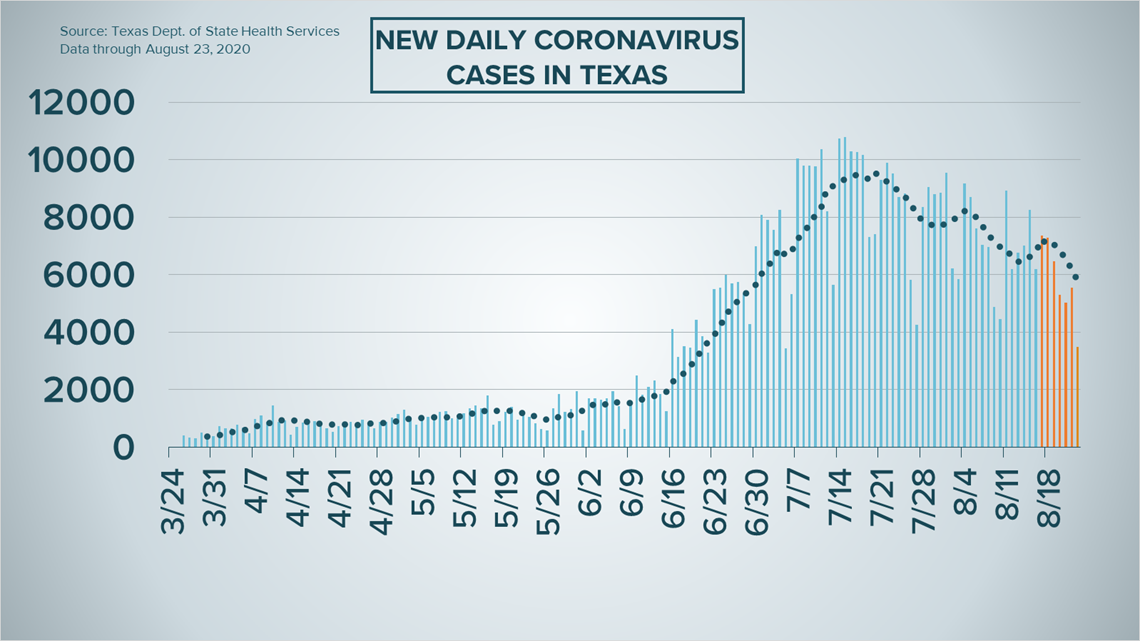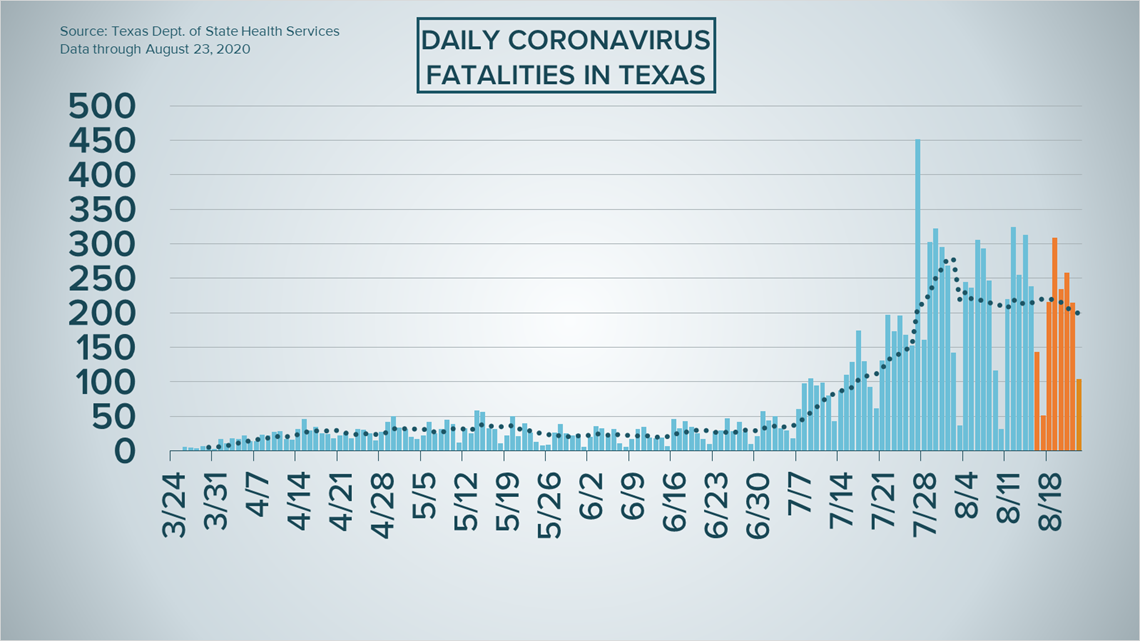SAN ANTONIO — We're tracking the latest numbers from the coronavirus pandemic in San Antonio and across Texas. Here are the latest numbers reported by Bexar and surrounding counties:
- Bexar County: 99 new cases were reported Sunday, bringing the total number for the county to 45,255. The county death toll, meanwhile, rose to 721 after nine additional fatalities were reported.
- Comal County: The county reported just nine new cases but two additional deaths Friday, the last time officials reported new figures. There have been a total of 2,857 cases of COVID-19 in the county – including 2,270 confirmed cases – while 80 county residents have died. County officials say there are 514 active coronavirus cases, and 2,263 residents are considered recovered.
- Hays County: Officials in Hays County on Friday reported 20 new cases and no additional deaths in the county. As of Friday evening, there were a total of 5,250 lab-confirmed cases in the county (2,425 of which are active) while the death toll stayed put at 45.
How Bexar County is trending
We've tracked how many coronavirus cases have been confirmed in Bexar County from the time officials began reporting cases in March 2020. The graphic below shows the number of cases since June and charts those daily case numbers along a 7-day moving average to provide a more accurate picture of the overall coronavirus case curve in our area and the direction we're trending amid the pandemic.
On Sunday, Metro Health reported an additional 99 cases of the novel coronavirus for Bexar County. In all, at least 45,255 Bexar County residents have tested positive for the virus.


An additional nine virus-related deaths were also reported for Bexar County Sunday. That brings the local death toll to 721 since the pandemic began, with an additional 271 deaths under investigation.
Hospitalizations continue to fall for Bexar County, meanwhile. On Sunday, just 478 residents were receiving treatment for COVID-19 symptoms; that's the lowest the number has been since June.


The number of patients in intensive care went down slightly to 206, and the number of patients on ventilators remained constant at 144.
Coronavirus in Texas
The Texas Department of State Health Services on Sunday reported an additional 3,493 cases of the novel coronavirus across the state, 862 of which came from a backlog of tests conducted in recent weeks. As of Sunday, at least 577,537 Texans have been infected with COVID-19.


Meanwhile, the state reported an additional 104 coronavirus-related deaths, bringing the total to 11,370.


Hospitalizations continue to go down for the Lone Star State when it comes to COVID-19. On Sunday, the number of Texans getting treatment for symptoms was down to 5,186.The last time the number was that low was June 26.
As the school year begins to get underway for local districts, we are also keeping track of the most important updates for each, including links to dashboards created to track coronavirus cases.
Latest Coronavirus Headlines
- President Trump announces plasma treatment authorized for COVID-19
- Young children frustrated and in tears over digital learning as parents try to adapt during coronavirus pandemic
- More than 200 positive COVID-19 tests from Walgreens backlog attributed to Bexar County
- Feeling alone in the pandemic? Robotic pets can serve as a companion
- Children with no COVID-19 symptoms may be more contagious than sick adults, study finds
- The Devil's checklist: Woman shares family's story of resilience after battling coronavirus, leukemia, house fire, loss
- CDC study suggests inmates should have been tested en masse for COVID-19
- COVID-19 controlled in 4-12 weeks if all wear masks, wash hands, social distance, CDC chief says
- San Antonio doctor opens South Texas' first coronavirus recovery clinic
Coronavirus symptoms
The symptoms of coronavirus can be similar to the flu or a bad cold. Symptoms include fever or chills, cough, shortness of breath or difficulty breathing, fatigue, muscle or body aches, headache, new loss of taste or smell sore throat, congestion or runny nose, nausea or vomiting and diarrhea, according to the Centers for Disease Control.
Most healthy people will have mild symptoms. A study of more than 72,000 patients by the Centers for Disease Control in China showed 80 percent of the cases there were mild.
But infections can cause pneumonia, severe acute respiratory syndrome, kidney failure, and even death, according to the World Health Organization. Older people with underlying health conditions are most at risk.
On June 25, the CDC expanded the list of groups at a higher risk of severe illness due to coronavirus.
Experts determined there was consistent evidence these conditions increase a person's risk, regardless of age:
- Chronic kidney disease
- COPD (chronic obstructive pulmonary disease)
- Obesity (BMI of 30 or higher)
- Immunocompromised state (weakened immune system) from solid organ transplant
- Serious heart conditions, such as heart failure, coronary artery disease, or cardiomyopathies
- Sickle cell disease
- Type 2 diabetes
The CDC believes symptoms may appear anywhere from two to 14 days after being exposed.
Human coronaviruses are usually spread...
- Between people who are in close contact with one another (within about 6 feet).
- Through respiratory droplets produced when an infected person coughs, sneezes or talks. These droplets can land in the mouths or noses of people who are nearby or possibly be inhaled into the lungs.
- Some recent studies have suggested that COVID-19 may be spread by people who are not showing symptoms.
Help stop the spread of coronavirus
- Stay home when you are sick.
- Eat and sleep separately from your family members
- Use different utensils and dishes
- Cover your cough or sneeze with your arm, not your hand.
- If you use a tissue, throw it in the trash.

